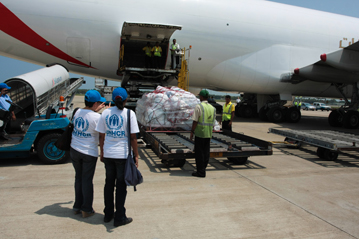New influx of Liberians in Guinea worries UNHCR
New influx of Liberians in Guinea worries UNHCR

FASSANKONY, Guinea, Sept 22 (UNHCR) - More than 4,500 new Liberian refugees have arrived in the last week in southern Guinea's forest region, stretching the UN refugee agency's capacity in this part of the country.
Local authorities have alerted UNHCR to an influx of some 2,000 new Liberian refugees in the locality of Fassankony, near Macenta in south-eastern Guinea, bringing to over 4,500 the number of arrivals since September 13.
The new arrivals in Fassankony are said to be from the Loma ethnic group and apparently fled Liberia's Lofa county fearing ethnic reprisal after the Liberian army pulled out from their hometowns and rebels of the LURD (Liberians United for Reconciliation and Democracy) announced they would take over these communes.
There have also been reports of some LURD presence in the Guinean town of Macenta, causing insecurity and anxiety among refugees, the local population and aid agencies alike.
UNHCR has sent missions to Fassankony to visit schools and public buildings where the new arrivals are being hosted. Reports of other newly-arrived groups, albeit in smaller numbers, have also been flooding in from neighbouring small villages.
The influx appears to be continuing, comprising mostly children, women and the elderly who are reported to be in dire need of food and health care. The Fassnakony clinic has already treated some of the most urgent cases.
Earlier last week, other groups of refugees arrived in the Yomou and Lola areas, further to the south of Guinea, along the border with Liberia. They reported fleeing a new spate of fighting between rebels and government forces in Liberia's Bong and Nimba counties, despite a recent cease-fire and transitional arrangement following the departure of former Liberian President Charles Taylor.
At the same time, some 300 Liberians have arrived in Guinea's Nzérékoré town and are being assisted at the reception centre.
UNHCR quickly organised registration and transfer teams and obtained formal agreement from the local authorities to start transferring the new arrivals to camps further inland. The convoys started last Tuesday for refugees in Lola and Yomou, who were taken to Lainé camp, pushing its population towards 27,000 refugees. Further convoys almost every day of last week helped move refugees from Fassankony to Kouankan camp.
So far, UNHCR has already transferred about 1,500 of the new arrivals to the two camps. It intends to continue with daily convoys until all the Liberians have been accommodated.
The refugee agency is also co-ordinating assistance with its partners on the ground - ICRC (International Committee of the Red Cross), MSF (Médecins Sans Frontières) to set up two mobile clinics, WFP (World Food Programme) to distribute high-protein biscuits to the most vulnerable in border towns, ACT (Action by Churches Together) to install water and sanitation in the reception centres and OCPH (Organisation Catholique Pour la Promotion Humaine) to deliver hot meals to the new arrivals. UNHCR will soon start distributing non-food items to the new arrivals.
The refugee agency is working within tight constraints, given the rainy season and bad roads, its limited capacity to transfer and receive new arrivals due to a lack of trucks, and limited infrastructure that can only receive 1,500 persons in Kouankan and 1,000 in Lainé every three days.
"This development is very worrying," said David Lambo, UNHCR's Africa Bureau Director in Geneva, on the recent influx into Guinea. "It is obvious that many areas in Liberia are still very insecure and fighting continues."
He added, "It is vital that peacekeepers are deployed throughout Liberia as soon as possible. We cannot afford to have a large-scale outflow of refugees into neighbouring countries at this time. On the contrary we should be moving towards a post-conflict recovery stage and prepare for repatriation as soon as possible."
UNHCR estimates there are nearly 116,000 Liberian refugees in the south of Guinea, including some 67,000 assisted in four camps, while the rest are spontaneously settled in the urban centres. The largest camp is Kouankan, north-east of the town of Nzérékoré, with nearly 28,000 refugees.
This year alone, some 86,000 new Liberian refugees have fled to neighbouring Côte d'Ivoire, Guinea, Sierra Leone and Ghana, bringing to 310,000 the total number of Liberians in exile.









